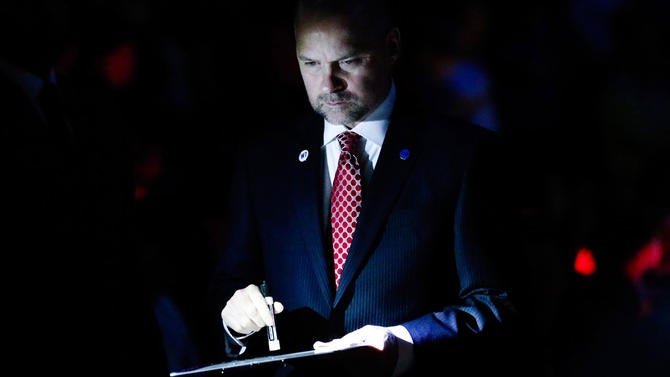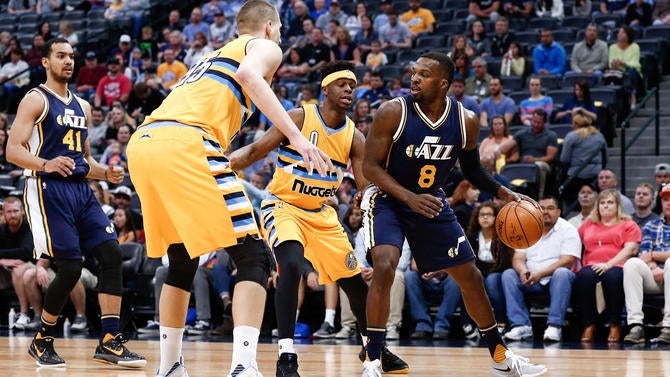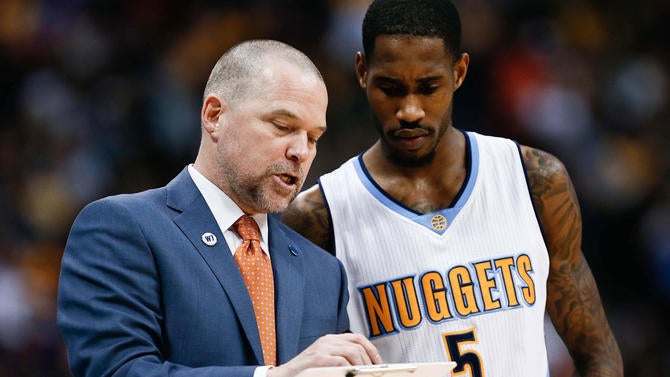Michael Malone was very nearly never here, in the NBA sense.
"I could be working for the treasury department doing detail for the President and getting shot at, or I could be a coach in the NBA," the Denver Nuggets boss told CBS Sports this summer.
It's true. When Malone was younger, he was working at Foot Locker in the day, and working with an office cleaning crew from midnight to 4 a.m., while he worked at Oakland University as an assistant under Greg Kampe.
"I said 'I do love coaching. But right now I'm working at a Foot Locker and cleaning up urinals. You know what? I'm better than this.' And I always had an interest in law enforcement and the Secret Service."
The men in Malone's family are made up essentially, of two things: law enforcement and coaching. Malone applied to the Secret Service and was denied, but a family contact told him that if he became a state trooper, he could then get into the Service.
Malone was in the middle of that process in Michigan -- he had already taken his exams -- when he got a call from Pete Gillen at Providence to take an assistant coaching position.
"As Yogi Berra said, 'I came to a fork in the road and I picked it up.'"
Now Malone's entering the fourth straight season at the helm of an NBA team, and this lifer -- the son of an NBA lifer, Pistons assistant Brendan Malone -- still takes losses hard. Probably too hard.

The running joke among Nuggets media as the rebuilding process last season dragged on was how long it would take Malone to come out to talk to the media post-game. We didn't know if he was talking things through with his coaches, talking with/yelling at the players, or just in his office punching the wall like Beatrix Kiddo when she's in the coffin in "Kill Bill." By the end of the season I put the over/under at 40 minutes and he hit the over twice. Danilo Gallinari would routinely slip out, fully dressed in street clothes by the time Malone was through. He managed to outpace the Italian fashion model getting dressed.
That's how hard Michael Malone takes losses.
It's a tough line to walk. Malone, like every coach, wants to win. He wants to win every single game and doesn't want to sacrifice the entire point of competition -- winning-- to further the team's long-term vision. Unfortunately for Malone, the Nuggets are likely going to lose a fair amount this season. On top of a brutal opening schedule (they face eight playoff teams between opening night and Nov. 13th and only two of those are home games ... versus the Blazers and Warriors), they feature 10 players under the age of 25 on the current roster.
Denver kept the powder dry with free agency instead of overspending on a player available. Their only real attempt to sign a big-name free agent came with their very public involvement in the Dwyane Wade sweepstakes. The superstar addition did not come to give Malone the elite talent you need in this league. It's going to be another tough year, and Malone knows it, even if he's not willing to give up on the idea that his team can win any game they go into.
"We have a young team, for sure," Malone said. "I hate to lose. I'm competitive. I go into every game truly expecting to win. My expectation, going into every game because we're prepared, we've got everything down, is to win.
"But at the same time, I've got to do a better job of not taking losses so hard. It's a long year. I have to be able to take a deep breath. If we come back young, or younger, I'm ready."
The good news is that under the radar, the Nuggets have some things cooking. With Nikola Jokic looking like a star in the Olympics, Gary Harris developing into a multifaceted weapon on both ends of the floor, and the still sky-high potential of Emmanuel Mudiay, plus Jusuf Nurkic and rookie Jamal Murray, Denver's young core is exceptional, maybe the second-best in the league behind Minnesota (with apologies to the Lakers). Still, young teams don't win in this league, so Malone navigating the rocky terrain will be tough.
Malone is a big part of this equation, though. The players believe in him, and the culture change from the chaos of the Brian Shaw era to what Malone established along with veterans like Jameer Nelson and Mike Miller was night and day from the "put your cell phones in this box" era. Of note, in a season where nearly every significant player (Wilson Chandler, Nurkic, Gallinari, and Mudiay to name a few) missed major time with injury, Denver improved slightly on both offense and defense statistically. More notably, Denver had the 10th best defense after the All-Star break. That's the building block Malone is hoping to establish as a recipe for success.

Still, Malone is focused on making strides this season. He and his staff -- which underwent more changes this summer than the roster did -- conducted deep dives to try and resolve specific issues in their post-season postmortem.
"I try and take a step back and ask, 'What can we do better?'" Malone said. "I don't want to be that coach that says, 'This is how we do it,' because you've seen it, and I've seen it -- the league changes. If we have to change our pick-and-roll coverage, for example, our transition defense rules, we have to do that. If you have five guys running back to the paint, guess what? You're giving up 3's in transition."
Then again, it's hard to blame Malone for being stressed out about losses, given how his NBA coaching career has gone. Malone was in a very similar spot in his second season in Sacramento. A tough first year, but one with growth, real signs of development, and a promising second season ahead. Sacramento got off to a fast start and were the buzz of the league in December of 2014. Then DeMarcus Cousins went down with a fluke bout of viral meningitis. The subsequent slip led to Malone being fired.
Malone's has not gotten over that experience. He learned a lot in "Sac" as he says, but there's a clear disappointment and bitterness over how that went down. Who was responsible for what went wrong with the Kings is a question that if you ask a different person, you get a different answer, and everyone is 100 percent sure they have all the answers on what really went down. Malone confirmed on the Lowe Post podcast that neither he, nor his family, have worn purple since he was fired. That's commitment.
This reaction from Malone makes more sense when you view it from the perspective of how passionate the former Cavs, New Orleans Hornets, and Warriors assistant is about the game and what he does. Malone can sometimes flirt with the notion of being a "hot head," and when he gets worked up he can seem like "Anger" from "Inside Out."
But Malone is well regarded in NBA circles by everyone from league's top players (LeBron James and Stephen Curry) to the Nuggets because of his ability to connect with his players. It's a commitment to personal relationships that Malone says he learned in part from San Antonio Spurs coach Gregg Popovich.
"When I got my job in Sacramento," Malone related, "Coach Popovich in San Antonio has had an impact on my career in a very positive way. He called me up and he was so happy for me, and he said, 'Listen, always be true to yourself. You're fiery, you're emotional,' just like he is. He goes, 'But ... my players know that I love them. So when I get on them, I follow it up with a hug and a pat on the back and let them know I care about them.'
"You have to let them know 'I love you, and I care about you as a person first.'"
For Malone with Denver, that means a wider range of connections than it does for even most NBA coaches. He's got a teenager from Ontario (Murray), a 20-year-old from the Republic of Congo by way of Texas (Mudiay), a 21-year-old from Serbia, and veterans from Italy, Benton Harbor, Michigan, Newark, and Philadelphia.
And yet the the process for Malone remains unchanged.
"It all starts at the ground level: get to know them," Malone said. "Whether you're a 19 year-old from Toronto, or a 20-year-old from Madrid, or a 21-year-old from Bosnia, to me, none of that matters. If I don't get to know them, there's never going to be a connection. I'm still a pretty young, hip guy which helps.
"Monty Williams, who I worked with in New Orleans, had a saying. 'The players don't care how much you know until they know how much they care.'"
That is not an issue with Malone. Getting the offense and defense to average league levels, navigating what may be the toughest division in basketball, and somehow winning back Denver fans who have abandoned the team in droves are bigger issues. Every team in Denver is overshadowed to a painful degree by the World Champion Broncos, but the Nuggets were dead last in attendance last season. If you wanted to know what NBA play calls sound like, you could have just come to the Pepsi Center and sat literally anywhere in the building.
For Malone, though, he knows first hand how tough the job can be, how disposable NBA coaches are, and how the public often has a misconception of how important NBA coaching is to the success of a team.
"I think there are so many people that think it's "roll it out and let 'em play,'" Malone said when asked what the biggest thing people misunderstand about coaching is. "You just draft talent and let them go. Obviously that's a misperception. The greatest way I can explain that is there are so many examples, and I've heard it time and time again from players who get into the coaching side; they always say, 'Man, I had no idea how hard you guys worked. I had no idea how much time you put in, how much film you watched, how many meetings you have.' So much goes into it."
If Denver stagnates again (which leads to further ticket sale troubles), if the talent stagnates, if another bad break happens beyond Malone's control, the pressure will mount. That's the reality of how coaching in the NBA works. Most people are waiting for a reason to care about the Nuggets, even in Denver.
But building a successful team means starting with culture, and Malone has already come a long way in building that for Denver. This season has promise for Denver, but it's an uphill climb, and one thing you can't say is that Malone isn't ready for the workload.
"I grew up with the ball," Malone said. "I'm the son of a coach. I know just how hard it is, and the demands of the job."
AFTER THE BUZZER

Malone coached LeBron James for five seasons as an assistant under Mike Brown from 2006-10. So I had to ask him about James' performance in the Finals. His response was spot on:
"Me, Mike Miller and Will Barton would sit and have a lot of conversations about players. Kobe or LeBron? Everybody wants to get into these conversations. Who's the greatest? Who's better? Kobe, LeBron? I'd say 'I coached LeBron for five years, I know what he's capable of.' Fast forward to the Finals and Cleveland's down 0-2. I get a text from Will Barton -- and he's probably gonna be mad I'm saying this -- and he goes 'I don't know, coach, Kobe wouldn't go out like that.' And so my reply to Will was 'It's not over yet, Will. It's not over yet.'
"I'm not just saying this because I coached LeBron and have a good relationship with him. I'm not surprised (at him leading the Cavaliers to a comeback over the 73-win Warriors after being down 3-1). I've seen that guy; he took us to the NBA Finals in our second year. With some good players, I'm not going to disrespect that team, but there's no way we should have been in the Finals in our second year in Cleveland. That was LeBron James.
"The year after we lose in the Eastern Conference Finals. You look at his stat line against Orlando in that series, he was Superman, not Dwight Howard, what he had to do. I never doubt LeBron. He's proven time and time and time again, up against the wall, what he's going to do to help his team win.
"LeBron James is, in 10, 15 years is going to be right up there with Michael Jordan as you say 'Who's the greatest of all-time. LeBron impacts the game on so many different ways. Scoring rebounding playmaking steals, one of the greatest blocks in NBA Finals history. What more can a guy do, what more can you ask of him? I'm not surprised. It was great to see an NBA Finals that went down not only to Game 7, but to the wire. And in the end, LeBron, with a fully healthy team, showed just how great of a player he is."


















